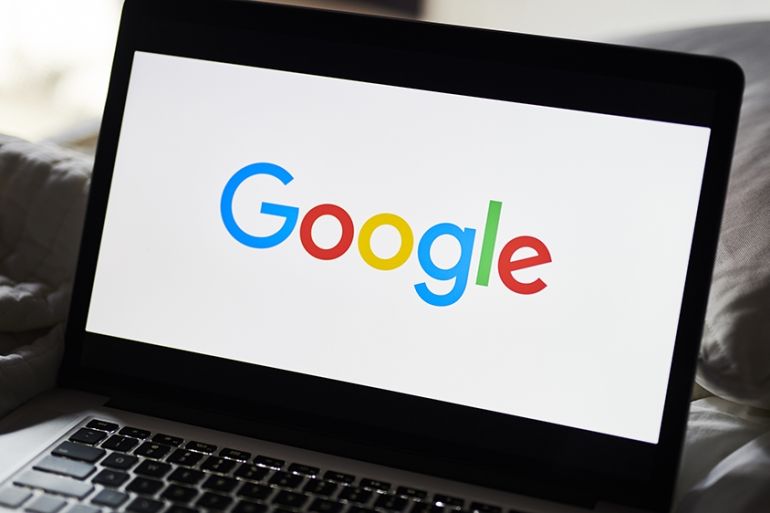Alphabet warns of difficult quarter as Google ad growth slows
With Google’s sales down, the company will pare hiring, internships, marketing, office expansions and other spending.

Alphabet Inc on Tuesday beat analysts’ estimates for quarterly revenue as its Google unit posted double-digit advertising growth despite the economic slowdown from the novel coronavirus.
Shares of Alphabet rose four percent to $1,282 following the after-hours release of financial results. Alphabet shares were down about eight percent this year at Tuesday’s close.
Keep reading
list of 3 itemsOn political advertising, Google tweaks its rules
Google to buy smartwatch maker Fitbit for $2.1bn in cash
A booming economy and rising internet usage have driven Google to record revenues in the last few years. But the virus has split those two trends, with consumer spending now plunging and reliance on internet services surging.
Alphabet Chief Financial Officer Ruth Porat told analysts on Tuesday that while users were searching more, they were looking up less commercial topics, and advertisers were cutting spending.
“As of today, we anticipate the second quarter will be a difficult one for our advertising business,” Porat said.
Porat said search ad revenue had declined by a “mid-teens percentage” by the end of March compared with a year earlier.
Alphabet’s overall revenue in the first quarter was $41.2bn, up 13 percent compared with the same period last year. The average revenue estimate among financial analysts tracked by Refinitiv was $40.29bn, up 10.87 percent. If their estimates are shown to be true, it would suggest Alphabet is experiencing its slowest growth since the second quarter of 2015, when it clocked in at 11.1 percent. While Google tools including Duo video chatting and YouTube have become essential to many users this year, the company largely does not charge for them and instead generates revenue by selling ad tools as well as links, banners and commercials on its services and those of partners.
But more than 26 million people have filed for unemployment during the last month in the United States, Google’s largest market for ad sales, erasing all of the country’s job gains in the last decade. Google’s ads business generated about 83 percent of Alphabet’s revenue last year. It tends to flow with the broader economy, which explains Alphabet’s slower revenue growth in the first quarter.
Google ad sales were $33.8bn, up about 10 percent from last year’s first quarter.
“YouTube provided an upside surprise, with growth actually accelerating despite the impact on ad budgets from the lockdowns,” said James Cordwell, analyst at Atlantic Equities.
About 5.5 percent of Alphabet’s revenue last year came from cloud services, for which Google charges businesses, schools and governments. This year, the company has extended various free offers to aid customers affected by the coronavirus pandemic.
The cloud business generated $2.8bn in revenue, up 52 percent from a year ago.
Alphabet’s total costs and expenses rose about 12 percent from a year ago to $33.2bn.
With usage of Google’s services up but sales down, the company in the current quarter has introduced what analysts have called “austerity” measures. It has pared hiring, internship programmes, marketing, office expansions and other spending plans.
Google just three months ago had said it would accelerate overall spending to add more staff for its cloud business and other areas where it is challenging to unseat dominant competitors.
The company does not forecast revenue or profit. But the current quarter and remainder of 2020 could be bleak, according to some outside forecasts by ad agencies and other industry consultants. Two expected boosts to revenue – the US presidential election and the Olympics – will offer smaller bumps because of the virus as campaigning grows more muted, and the Tokyo games get pushed to next year. Some have estimated ad sales declines of up to 20 percent in the coming quarters.
Investors have become accustomed to unpredictability from Alphabet, though, even before the virus appeared. People have been interacting more with phones and smart speakers, which has forced Google to experiment with new ways to display ads, some of which advertisers have not valued as highly as legacy formats. Currency fluctuations and a greater push by advertisers to avoid offensive content have hurt Google, too.
Alphabet’s first-quarter profit was $6.8bn, or $9.87 per share, compared with the analysts’ average estimate of $7.21 billion, or $10.40 per share.
Its profit figures can be difficult to compare because they include gains and losses accumulated only on paper from its investments in startups and other outside businesses.